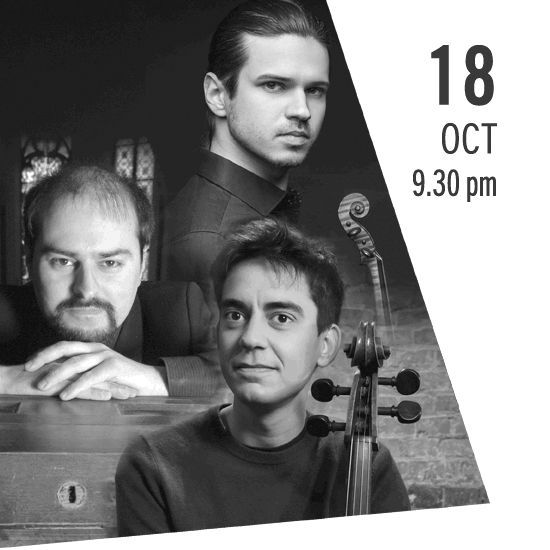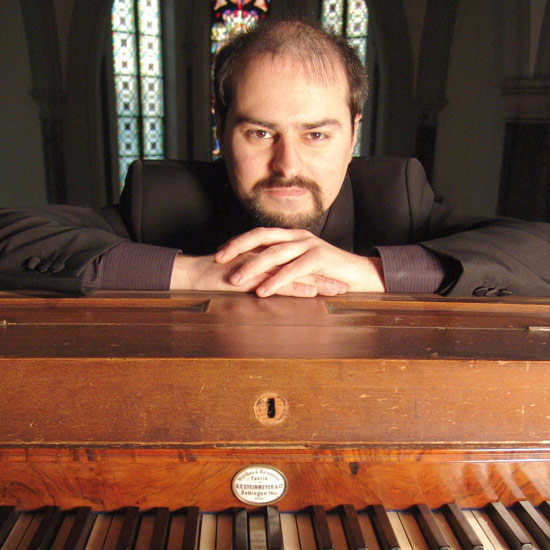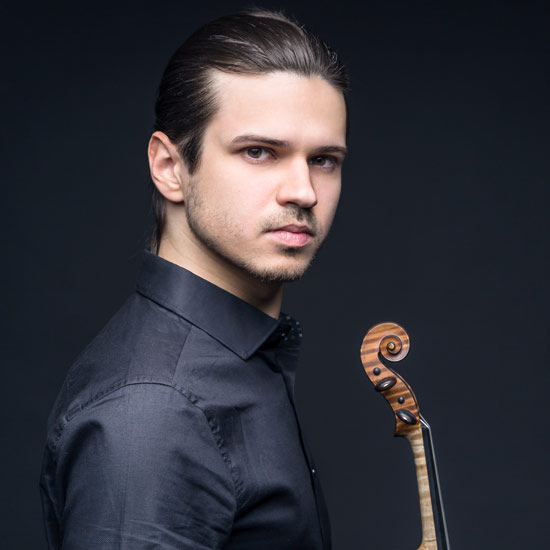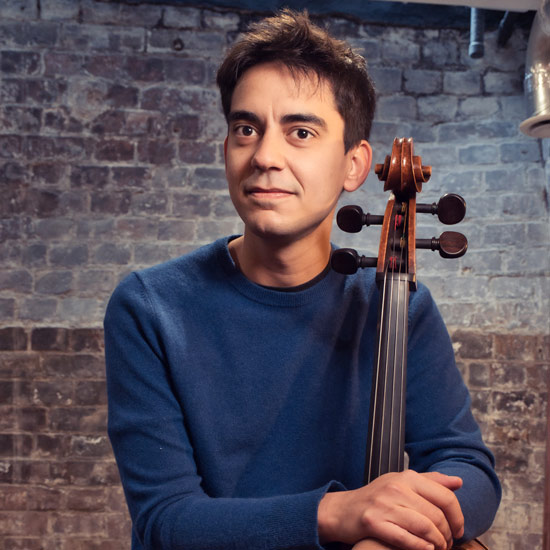 October 18, Wednesday, 9.30 pm;
October 18, Wednesday, 9.30 pm;
Igreja de São João Evangelista (Colégio) · Funchal;
RHEINBERGER – MUSIC FOR ORGAN AND STRINGS
Manuel Tomadin, organ;
Nikita Kuts, violin;
Pedro Silva, cello;
“An ideal composition teacher, with no equal within or outside Germany.” These are the words with which Josef Gabriel Rheinberger, a musical prodigy, was defined. The composer and teacher from Liechtenstein was born in Vaduz in 1839, and at seven years of age became organist of the Chapel of St Florin, in the same country. Initially, his father opposed his son’s wishes to follow the life of a professional musician, but in the end allowed him to go to the Munich Conservatoire at the age of 12. At 13 he was appointed deputy organist of the church of the Court of St Michael. He distinguished himself not only as a composer, but also as a music teacher. More than six hundred students from all over the world inherited the musical capacities of Josef Gabriel, among them the great conductor Wilhelm Furtwangler, who wrote in 1940: “his point of orientation was always musical naturalness, reflected in his vocal conducting, with hi sense of form and means of expression.” When he died in 1901, in Munich, where he lived all his adult life, he had published almost two hundred works: music for piano and organ, organ concertos, masses, hymns, chamber music, symphonies and concert overtures. In 1867 he married his former pupil the poet Franziska von Hoffnaass (Fanny), who wrote many of the texts for Rheinberger’s vocal works. Certainly his wife had a significant influence on her husban’s artistic ideas, but he was also influenced by painting and literature (especially English and German). His religious works include twelve Masses, a Requiem and a Stabat Mater. His other works include symphonies, chamber music and choral music. When the current Conservatoire was founded in Munich, Rheinberger was appointed professor of organ and composition, a position he held until his death. He showed a phenomenal capacity in his organ writing. His sonatas were acclaimed as “[…] without doubt the most important contribution to organ music since the time of Mendelssohn […], characterized by a happy amalgam of a modern romantic spirit, masterly counterpoint and noble organ style.” As well as two splendid concertos for organ and orchestra, he also wrote chamber music for various instruments, including two suites for organ and violin and a suite for organ, violin and cello. Power of invention, masterly technique and a noble and solid style are some of this noteworthy characteristics. What is extremely attractive in the music of Rheinberger is that it inclines more towards clean lines and clear textures; on the other hand, other composers showed a tendency for dense textures, opaque even, at times creating a sound similar to that of supporting oneself on the whole keyboard using the full. From the chamber music composed by Rheinberger there stand out that for organ and instruments, and the use of strings such as violin and cello but also of oboe in two very interesting compositions of the highest level. Frequently some pieces were recycled for different scorings; this is the case of
Abendlied, das Elegie and the Pastorale, of which we find versions for violin and organ or cello and organ, transposed to appropriate tonalities. The same occurs with one of his masterpieces, the Suite in C minor, op. 149, both in the version for trio (violin, cello and organ) and also that for orchestra and solo trio. This Suite is truly a remarkable masterpiece in which the two stringed instruments are interwoven with the organ, which takes the place of the orchestra; here too Rheinberger uses some older forms, such as the saraband, or theme and variations.
Manuel Tomadin
Program
JOSEF GABRIEL RHEINBERGER (1839-1901)
Organ sonata nº 19 Op. 193 in g minor
Molto moderato ma energico
Provençalisch
Introduction und Finale
Abendlied Op. 150, nº 2
Suite for violin cello and organ Op. 149 in c minor
Con moto
Thema mit Veräderungen
Sarabande
Finale
 Manuel Tomadin
Manuel Tomadin
Manuel Tomadin is probably the Italian organist of his generation who has won most prizes in performance competitions. He graduated with the highest marks in organ, composition for organ and harpsichord (cum laude), and studied harpsichord. He teaches organ at the Giuseppe Tartini Conservatoire in Trieste. He dedicates himself constantly to the deepening of problems inherent in the performance practice of renaissance and baroque music, as well as by means of the study of period instrumental treatises. From 2001 to 2003 he studied at the Schola Cabtorum Basiliensis (Switzerland) in the class of Jean Claude Zehnder. Of great importance for his education were the classes he took with Ferruccio Bartoletti and Andrea Marcon. He has an intensive activity as a concert artist, both as soloist and in groups or accompanist throughout Europe. He has recorded various discs for a number of prestigious labels, making use particularly of the historical organs of Friuli Venezia Giulia, the Netherland and Germany. His CDs of Bruhns-Hasse, Kneller-Leyding-Geist, Tunder, Saxer-Erich-Druckenmulle and Krebs have been classified as “5 Diapasons” by the French magazine Diapason. He is artistic director of the Orgelherbst organ festival in Trieste and titular organist of the Lutheran Evangelical Church of the same city. He has won ten national and international competitions, including the second prize (the first was not attributed) of the prestigious “Paul Hofhaimer” competitions in Innsbruck twice (2004 and 2010) and the first prize at the Schnitger Organ Competition in Alkmaar, Netherlands, with the title ECHO Young Organist 2012.
 Nikita Kuts
Nikita Kuts
Nikita Kuts was born in 1997 and at the age of six began studying violin under the orientation of Nana Khachkalyan, at the then Coordinating Office of Artistic Education of Funchal. He continued his studies at the Professional Conservatory School of Arts of Madeira, under Norberto Gomes, finishing with a distinction. During these years he won a number of competitions in Portugal, notably the first prize of the Capela Competition, in Lisbon. He took part in various orchestral internships under the direction of conductors such as Jean-Sébastien Béreau, Antony Hermus, Cesário Costa, Rui Pinheiro and Martin André. He also took part in master classes with renowned teachers such as Ilya Grubert, Boris Kuschnir, Liviu Prunaru, Eliot Lawson, Alissa Margulis and Yuri Zhislin. Nikita Kuts was soloist of the Orchestra of the Closing of the Season 2014/2015 of the Madeira Classical Orchestra, having been invited again in 2017. He played with the Orchestra XXI on a number of tours, directed by Dinis Sousa. He finished his licentiature at the Amsterdam Conservatoire in 2019, under Ilya Grubert, and then the Certificate of Performance, which he was awarded with the highest classification at the Private School of Music and the Arts in Vienna, as part of the class of Boris Kuschnir. He is currently undertaking a masters at the same school, under Dalibor Karvay.
 Pedro Silva
Pedro Silva
Pedro Silva começou sua formação em violoncelo sob a orientação de Lázsló Szepesi no Conservatório Escola das Artes da Madeira, concluindo posteriormente o seu mestrado na Royal Academy of Music em Londres, onde foi aluno de Guy Johnston. Em 2014 foi vencedor do Solo Bach Prize for cello da Royal Academy of Music, pela sua interpretação da terceira Suite de Bach para violoncelo solo. Hoje, Pedro Silva goza de uma carreira multifacetada, atuando como solista, músico de câmara e membro de orquestra em diversos cenários internacionais, incluindo Portugal, Reino Unido, Coreia do Sul, Brasil, Irão, Arábia Saudita, entre outros. Colabora activamente com várias formações musicais, como a Orquestra XXI em Portugal, a BBC Concert Orchestra e a National Symphony Orchestra of Great Britain no Reino Unido. Com um foco particular em interpretações historicamente informadas, Pedro Silva associa-se a grupos especializados como The Mozartists, La Nuova Musica e Classical Opera Orchestra, onde actua como violoncelista barroco. Além de sua carreira musical, Pedro Silva é também co-fundador da empresa MyLuthier, dedicada à promoção e divulgação de instrumentos musicais contemporâneos.
